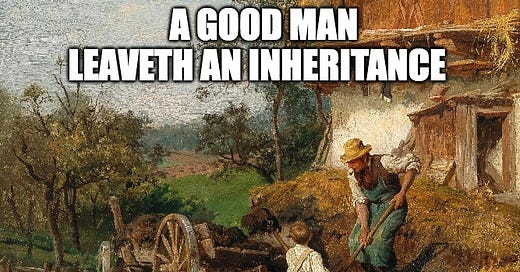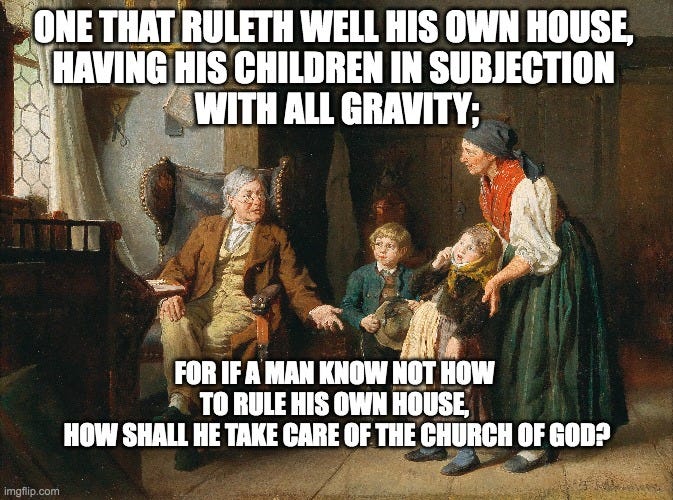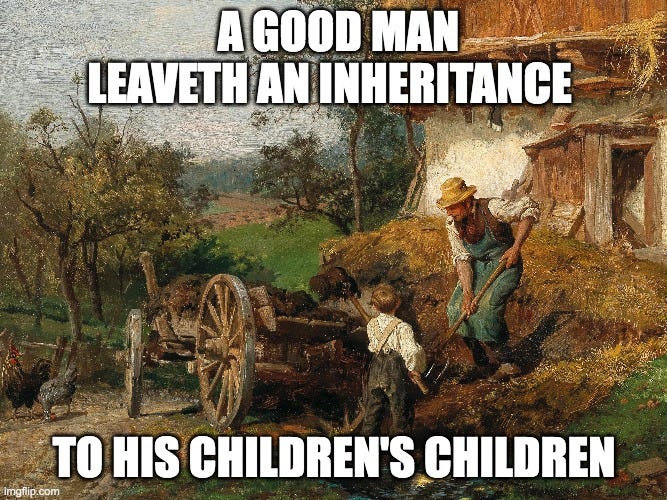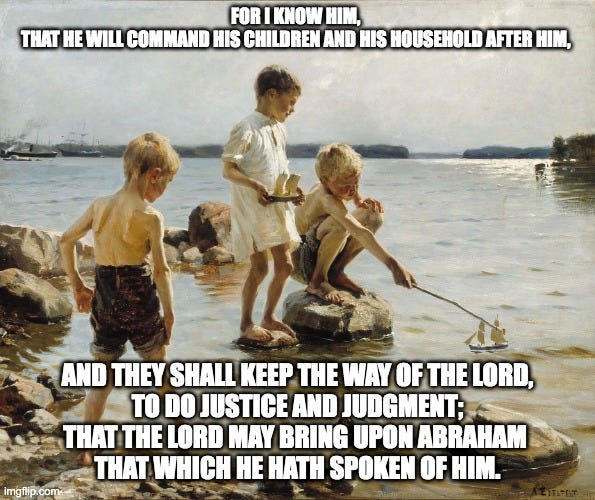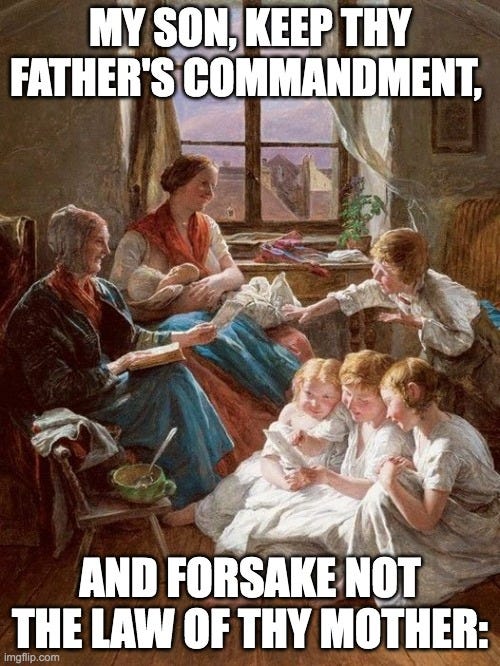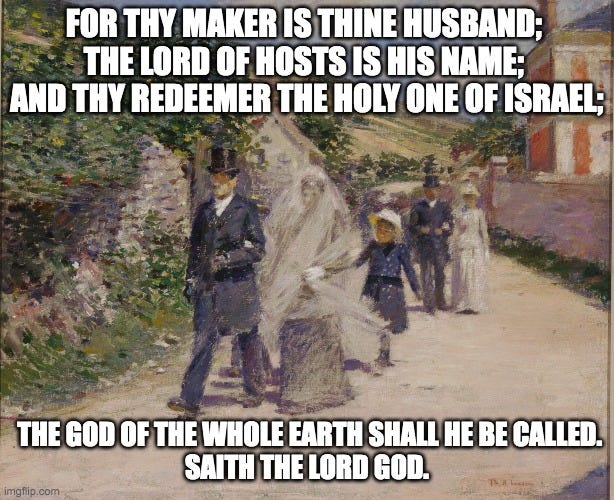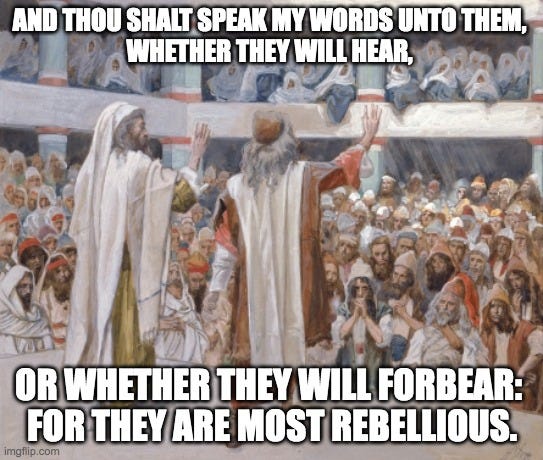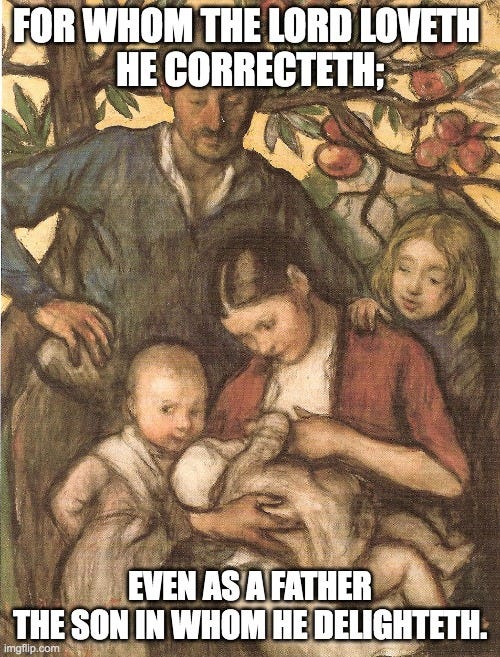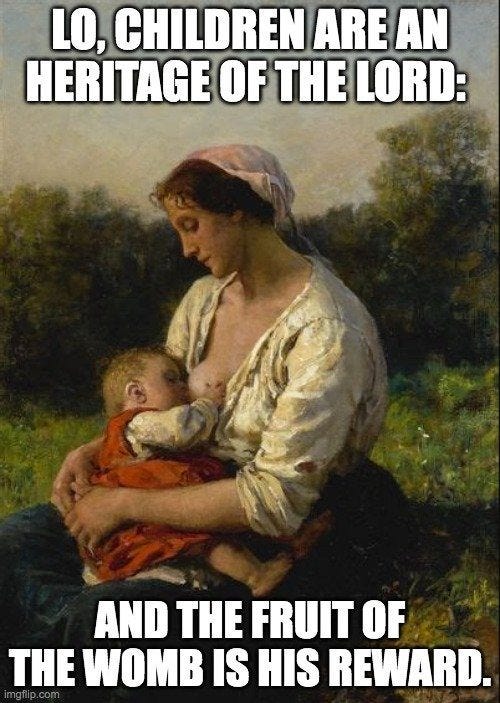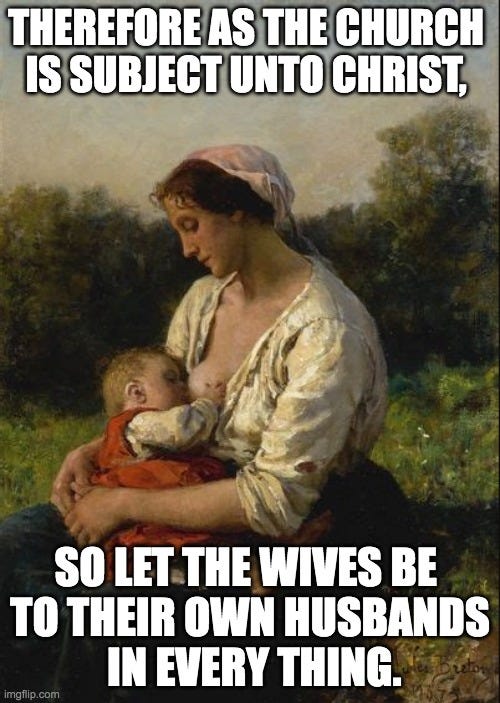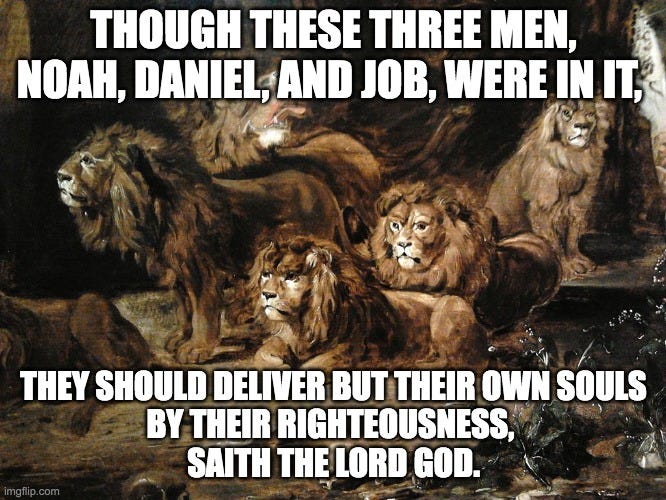I have no greater joy than to hear that my children walk in truth.
3 John 1:4
A son honoureth his father, and a servant his master: if then I be a father, where is mine honour? and if I be a master, where is my fear? saith the LORD of hosts unto you, O priests, that despise my name. And ye say, Wherein have we despised thy name?
Malichi 1:6
What does it mean to be a patriarch? Not the modern nonsensical definition, but the actual Biblical definition. Well, among other things, it means having a people that come from you. And are called by your name.
One of the more common of Old Testament blessings is exactly this: that the person being blessed would have an entire nation, or even many nations, of people that come from his seed and are called by his name.
Abraham
And Abram said, Lord GOD, what wilt thou give me, seeing I go childless, and the steward of my house is this Eliezer of Damascus?
And Abram said, Behold, to me thou hast given no seed: and, lo, one born in my house is mine heir.
And, behold, the word of the LORD came unto him, saying, This shall not be thine heir; but he that shall come forth out of thine own bowels shall be thine heir.
And he brought him forth abroad, and said, Look now toward heaven, and tell the stars, if thou be able to number them: and he said unto him, So shall thy seed be.
Genesis 15:2-5
Now the LORD had said unto Abram, Get thee out of thy country, and from thy kindred, and from thy father's house, unto a land that I will shew thee:
And I will make of thee a great nation, and I will bless thee, and make thy name great; and thou shalt be a blessing:
And I will bless them that bless thee, and curse him that curseth thee: and in thee shall all families of the earth be blessed.
Genesis 12:1-3
Ishmael
And as for Ishmael, I have heard thee: Behold, I have blessed him, and will make him fruitful, and will multiply him exceedingly; twelve princes shall he beget, and I will make him a great nation.
Genesis 17:20
And God heard the voice of the lad; and the angel of God called to Hagar out of heaven, and said unto her, What aileth thee, Hagar? fear not; for God hath heard the voice of the lad where he is.
Arise, lift up the lad, and hold him in thine hand; for I will make him a great nation.
Genesis 21:17-18
Isaac
And there was a famine in the land, beside the first famine that was in the days of Abraham. And Isaac went unto Abimelech king of the Philistines unto Gerar.
And the LORD appeared unto him, and said, Go not down into Egypt; dwell in the land which I shall tell thee of:
Sojourn in this land, and I will be with thee, and will bless thee; for unto thee, and unto thy seed, I will give all these countries, and I will perform the oath which I sware unto Abraham thy father;
And I will make thy seed to multiply as the stars of heaven, and will give unto thy seed all these countries; and in thy seed shall all the nations of the earth be blessed;
Genesis 26:1-4
Israel/Jacob
And God spake unto Israel in the visions of the night, and said, Jacob, Jacob. And he said, Here am I.
And he said, I am God, the God of thy father: fear not to go down into Egypt; for I will there make of thee a great nation:
Genesis 46:2-3
And what one nation in the earth is like thy people, even like Israel, whom God went to redeem for a people to himself, and to make him a name, and to do for you great things and terrible, for thy land, before thy people, which thou redeemedst to thee from Egypt, from the nations and their gods?
II Samuel 7:23
Psalm 45
Hearken, O daughter, and consider, and incline thine ear; forget also thine own people, and thy father's house;…
Instead of thy fathers shall be thy children, whom thou mayest make princes in all the earth.
I will make thy name to be remembered in all generations: therefore shall the people praise thee for ever and ever.
Psalm 45:20,16-17
Note the difference for women. When they marry they are to forget their father’s house, and instead raise up the children that they have with their husband.
Moses
Now therefore let me alone, that my wrath may wax hot against them, and that I may consume them: and I will make of thee a great nation.
Exodus 32:10
And let us note the very interesting story of Moses who, when God was displeased with the nation of Israel, was offered his own patriarchal blessing.
David
I have made a covenant with my chosen, I have sworn unto David my servant,
Thy seed will I establish for ever, and build up thy throne to all generations. Selah.
Psalm 89:3-4
And the word of the LORD came unto Jeremiah, saying,
Thus saith the LORD; If ye can break my covenant of the day, and my covenant of the night, and that there should not be day and night in their season;
Then may also my covenant be broken with David my servant, that he should not have a son to reign upon his throne; and with the Levites the priests, my ministers.
As the host of heaven cannot be numbered, neither the sand of the sea measured: so will I multiply the seed of David my servant, and the Levites that minister unto me.
Jeremiah 33:19-22
Meanwhile, a Curse
Thus saith the LORD, Write ye this man childless, a man that shall not prosper in his days: for no man of his seed shall prosper, sitting upon the throne of David, and ruling any more in Judah.
Jeremiah 22:30
Jonadab
Honour thy father and thy mother: that thy days may be long upon the land which the LORD thy God giveth thee.
Exodus 20:12
So now we come to the example of Jonadab. His blessing is odd. We do not hear of his being given the blessing of a nation of his children before he had any, like Abraham or Ishmael. We don’t even hear it during his lifetime. It comes three hundred years later, when he already has many obedient descendants:
And Jeremiah said unto the house of the Rechabites, Thus saith the LORD of hosts, the God of Israel; Because ye have obeyed the commandment of Jonadab your father, and kept all his precepts, and done according unto all that he hath commanded you:
Therefore thus saith the LORD of hosts, the God of Israel; Jonadab the son of Rechab shall not want a man to stand before me for ever.
Jeremiah 35:18-19
Now, first of all, let us take a very brief excursion into the grammar of the passage. Let us notice that when God speaks to the Rechabites, He uses the masculine plural:
This is obvious enough in English (‘the Rechabites’), but I provide the interlinear here for clarification. Whereas in the blessing that ends the chapter, He uses the masculine singular:
Which is also reflected in the English (Jondab, the son of Rechab).
This pattern is consistent with all of the ways that these nations and peoples that come from patriarchs is discussed all throughout Scripture: Israel: the Israelites. Ishmael: the Ishmaelites, etc. A father: and his seed. A patriarch: and the nation (or people or nations) that come from that patriarch. A man: and the blessing that God gives him of a people.
An Objection
Your father Abraham rejoiced to see my day: and he saw it, and was glad.
John 8:56
My good friend finds something else in this pattern, at least when it concerns Jonadab:
God did not honor Jonadab for giving those commands to his children. God honored Jonadab’s children because they obeyed him. The children of Jonadab got a blessing. It had nothing to do with Jonadab other than that he was the overbearing patriarch to whom they gave obedience.
…
Now, I’m sure there are some who will scream, “But the text literally say’s “Jonadab!” not his children!” I know that. But please note that the phrase “Jonadab son of Rechab” is equivalent to saying, “the Rechabites”. It is a tribal saying. It’s a covenantal saying. Every Rechabite who heard that blessing took it as a blessing on himself and his family. It is the Rechabites as a tribe that had the promise that they will always have a male descendant who stands before the Lord. It is they who were rewarded for their obedience, not their 300 year dead father. This was an actual blessing, not a theoretical blessing which somehow gave a mystical blessing to a 300 year dead man. It was a real blessing given to hundreds of actual living people. In the bible a personal name is used interchangeably throughout scripture for the descendants of that person. Jonadab the person, who was 300 years dead, received no blessing here.
There is almost nothing that needs to be said in response to this. The Scriptures from one end to the other demonstrate to us that one of the most powerful blessings that can be given to a man is that he have children, that these children have children, and that generations later there would be a whole nation of children that came from him.
And that these children would serve the LORD. That they would be blessed by God.
The Scriptures, from beginning to end, make no distinction between a blessing to a father, and a blessing to the people that come from him. When the father is blessed… that is a blessing on the nation that comes from him. When the nation is blessed… that is a blessing on the patriarch that engendered them.
There is no Scriptural distinction between ‘I bless thee’ and ‘I will bless thy children’. Indeed, there is no present distinction. It is hard to imagine the old man, seeing his children obeying him, and seeing them blessed by the LORD, who does not understand that that is the way that the LORD has chosen to bless him.
Thank you for reading Von’s Substack. I would love it if you commented! I love hearing from readers, especially critical comments. I would love to start more letter exchanges, so if there’s a subject you’re interested in, get writing and tag me!
Being ‘restacked’ and mentioned in ‘notes’ is very important for lesser-known stacks so… feel free! I’m semi-retired and write as a ministry (and for fun) so you don’t need to feel guilty you aren’t paying for anything, but if you enjoy my writing (even if you dramatically disagree with it), then restack, please! Or mention me in one of your own posts.
If I don’t write you back it is almost certain that I didn’t see it, so please feel free to comment and link to your post. Or if you just think I would be interested in your post!
If you get lost, check out my ‘Table of Contents’ which I try to keep up to date.
Von also writes as ‘Arthur Yeomans’. Under that name he writes children’s, YA, and adult fiction from a Christian perspective. His books are published by Wise Path Books and include the children’s/YA books:
The Bobtails meet the Preacher’s Kid
and
As well as GK Chesterton’s wonderful book, “What’s Wrong with the World”, for which ‘Arthur’ wrote most of the annotations.
Arthur also has a substack, and a website.
Thanks again, God Bless, Soli Deo gloria,
Von
Links
“You come of the Lord Adam and the Lady Eve," said Aslan. "And that is both honour enough to erect the head of the poorest beggar, and shame enough to bow the shoulders of the greatest emperor on earth. Be content.”
― C.S. Lewis, Prince Caspian
Some posts very specifically about Jonadab, the son of Rechab
Jonadab, the Son of Rechab
·
22 JULY 2024
The words of jonadab
·
6 AUGUST 2024
The Context of Jonadab
·
13 AUGUST 2024
And Jeremiah said unto the house of the Rechabites, Thus saith the LORD of hosts, the God of Israel;
Three Godly Fathers
·
15 JUNE 2024
Related Issues
Other posts dealing with the meanings of the words obey, submit, command… and how these are worked out in Scripture.
Honour Thy Father: Adam to Abraham
·
3 OCTOBER 2024
Then came to Jesus scribes and Pharisees, which were of Jerusalem, saying,
Trust... and Obey
·
11 MAY 2024
Trust, Honour, and Obey
·
21 MAY 2024
As Sarah Obeyed Abraham...
·
23 MAY 2024
Obey: Appendix
·
21 MAY 2024
Submission in Silence
·
15 JUNE 2024
Parthenogenic Parenting
·
17 FEBRUARY 2024
Problems with Patterns of Patriarchy
·
10 JULY 2023
Functional Obedience
·
30 MAY 2024
Judging the Patriarchs
·
8 JUNE 2024

